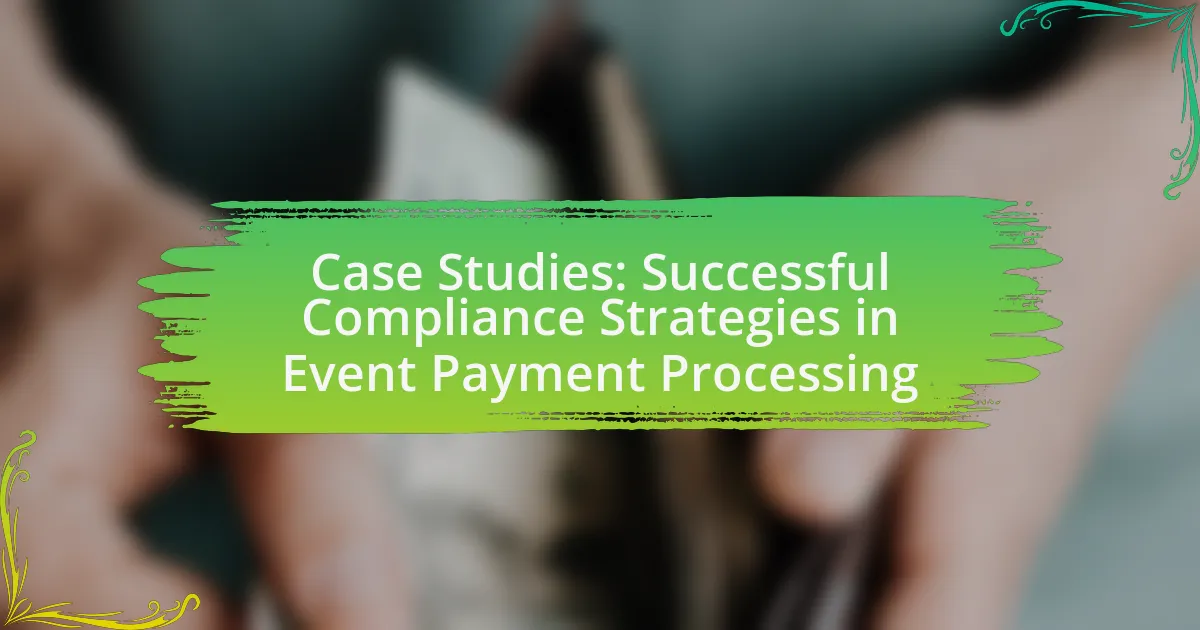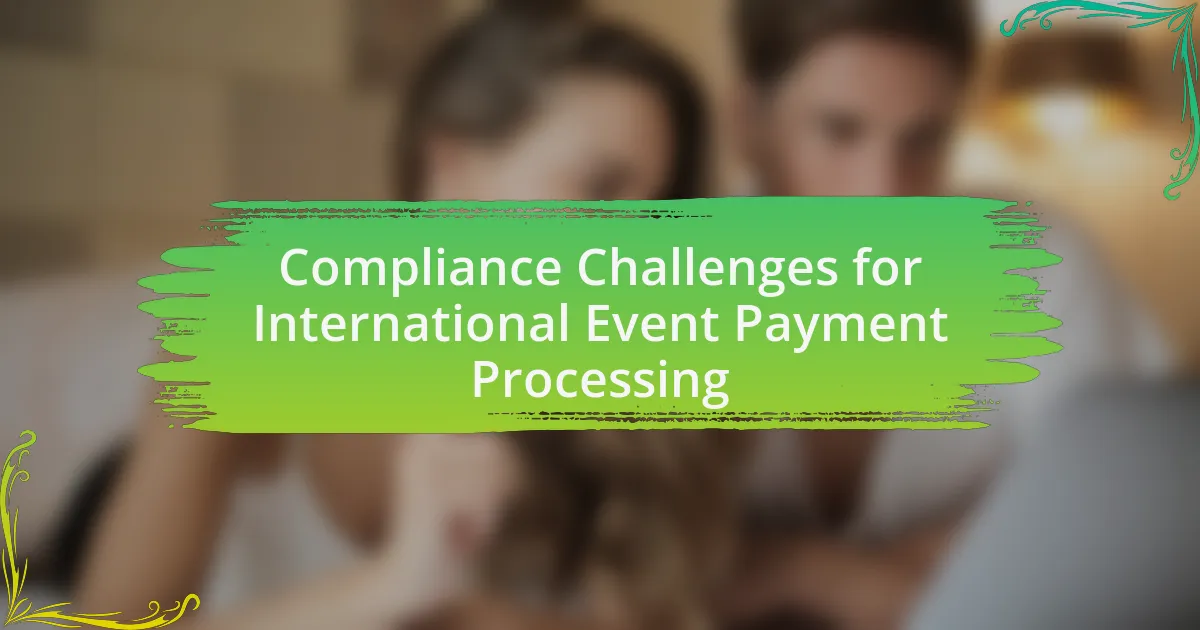A compliant payment gateway for events is a secure online platform that processes payments while adhering to legal and regulatory standards, such as PCI DSS. This article outlines the essential features and functionalities of compliant payment gateways, emphasizing the importance of security, regulatory adherence, and user-friendly design. Key considerations for selecting a payment gateway include transaction fees, integration capabilities, and customer support. Additionally, the article discusses the impact of compliance on protecting sensitive financial data, mitigating risks for event organizers and attendees, and ensuring a smooth payment process that enhances attendee satisfaction.
What is a Compliant Payment Gateway for Events?

A compliant payment gateway for events is a secure online platform that processes payments while adhering to legal and regulatory standards, such as PCI DSS (Payment Card Industry Data Security Standard). This compliance ensures that sensitive payment information is handled safely, protecting both the event organizers and attendees from fraud and data breaches. For instance, a compliant payment gateway must encrypt transaction data and maintain strict access controls, which are essential for safeguarding financial information during ticket sales or donations.
How does a compliant payment gateway function?
A compliant payment gateway functions by securely processing transactions while adhering to regulatory standards such as PCI DSS (Payment Card Industry Data Security Standard). This involves encrypting sensitive payment information, authenticating users, and ensuring that data is transmitted securely between the customer, the merchant, and the financial institutions involved. Compliance with these standards is crucial as it protects against data breaches and fraud, thereby maintaining consumer trust and safeguarding sensitive financial information.
What are the key features of a compliant payment gateway?
A compliant payment gateway must ensure security, regulatory adherence, and user-friendly functionality. Key features include PCI DSS compliance, which protects cardholder data; encryption protocols that secure transactions; and fraud detection tools that monitor and prevent unauthorized activities. Additionally, a compliant payment gateway should support multiple payment methods to cater to diverse customer preferences and provide transparent reporting for transaction tracking. These features collectively ensure that the payment process is secure, reliable, and meets legal standards, thereby fostering trust among users.
How does compliance impact the functionality of a payment gateway?
Compliance directly impacts the functionality of a payment gateway by ensuring that it adheres to legal and regulatory standards, which in turn affects its operational capabilities. Payment gateways must comply with regulations such as the Payment Card Industry Data Security Standard (PCI DSS), which mandates strict security measures for handling cardholder data. Non-compliance can lead to penalties, service disruptions, and loss of customer trust, ultimately limiting the gateway’s ability to process transactions effectively. For instance, a compliant payment gateway can offer features like secure data encryption and fraud detection, enhancing its reliability and performance in processing payments.
Why is compliance important for payment gateways in events?
Compliance is crucial for payment gateways in events because it ensures the protection of sensitive financial data and adherence to legal regulations. Payment gateways must comply with standards such as the Payment Card Industry Data Security Standard (PCI DSS), which mandates security measures to prevent data breaches and fraud. Non-compliance can lead to severe penalties, including fines and loss of business reputation, as evidenced by the fact that data breaches can cost companies an average of $3.86 million per incident, according to the Ponemon Institute’s 2020 Cost of a Data Breach Report. Therefore, compliance not only safeguards customer information but also mitigates financial risks for event organizers.
What regulations must payment gateways adhere to?
Payment gateways must adhere to regulations such as the Payment Card Industry Data Security Standard (PCI DSS), Anti-Money Laundering (AML) laws, and General Data Protection Regulation (GDPR). PCI DSS mandates security measures for handling cardholder data, ensuring that payment gateways protect sensitive information during transactions. AML regulations require payment gateways to monitor transactions for suspicious activity to prevent money laundering and fraud. GDPR governs the processing of personal data for individuals within the European Union, obligating payment gateways to ensure data privacy and protection. Compliance with these regulations is essential for maintaining trust and security in financial transactions.
How does compliance protect event organizers and attendees?
Compliance protects event organizers and attendees by ensuring adherence to legal and regulatory standards, which mitigates risks associated with financial transactions and data security. For instance, compliance with Payment Card Industry Data Security Standards (PCI DSS) safeguards sensitive payment information, reducing the likelihood of data breaches that could harm both parties. Additionally, compliance with local laws regarding permits and safety regulations helps prevent legal liabilities and enhances the overall safety of the event environment, fostering trust among attendees and organizers.
What factors should you consider when choosing a compliant payment gateway?

When choosing a compliant payment gateway, consider factors such as security, regulatory compliance, transaction fees, integration capabilities, and customer support. Security is paramount; ensure the gateway adheres to PCI DSS standards to protect sensitive payment information. Regulatory compliance is crucial, as the gateway must meet local and international laws governing financial transactions. Transaction fees can vary significantly, impacting overall costs, so evaluate the fee structure carefully. Integration capabilities are important for seamless operation with existing systems, ensuring that the gateway can work with your website or application. Lastly, reliable customer support is essential for resolving issues quickly, which can affect user experience and trust.
How do transaction fees affect your choice of payment gateway?
Transaction fees significantly influence the choice of payment gateway by directly impacting the overall cost of processing payments. Higher transaction fees can reduce profit margins for businesses, making it essential to select a gateway that offers competitive rates. For instance, if a payment gateway charges 3% per transaction, a business processing $10,000 in sales would incur $300 in fees, which could be substantial for smaller events. Therefore, businesses often compare transaction fees among various gateways to ensure they choose one that aligns with their financial goals and minimizes costs.
What are the typical fee structures for payment gateways?
Payment gateways typically employ several fee structures, including transaction fees, monthly fees, and setup fees. Transaction fees are often a percentage of the transaction amount, commonly ranging from 2% to 3%, plus a fixed fee per transaction, which can be around $0.30. Monthly fees may vary, with some gateways charging a flat rate, while others may not have any monthly fees at all. Setup fees can also differ, with some providers charging a one-time fee for account setup, which can range from $0 to several hundred dollars. These fee structures can significantly impact the overall cost of using a payment gateway, making it essential for businesses to evaluate their specific needs and transaction volumes when selecting a provider.
How can you evaluate the cost-effectiveness of a payment gateway?
To evaluate the cost-effectiveness of a payment gateway, analyze its transaction fees, monthly fees, and any additional costs associated with its use. Transaction fees typically range from 1.5% to 3.5% per transaction, while monthly fees can vary from $0 to $30 or more, depending on the provider. Additionally, consider hidden costs such as chargeback fees, currency conversion fees, and integration costs. Comparing these costs against the expected transaction volume and revenue can provide a clearer picture of overall cost-effectiveness. For instance, a payment gateway with lower transaction fees may be more cost-effective for high-volume businesses, while a flat-rate fee structure might benefit those with lower transaction volumes.
What security features should a compliant payment gateway have?
A compliant payment gateway should have robust security features such as PCI DSS compliance, encryption, tokenization, and fraud detection mechanisms. PCI DSS compliance ensures that the payment gateway adheres to industry standards for protecting cardholder data, which is critical for safeguarding sensitive information. Encryption protects data during transmission, making it unreadable to unauthorized parties, while tokenization replaces sensitive card information with a unique identifier, reducing the risk of data breaches. Additionally, effective fraud detection mechanisms utilize machine learning and analytics to identify and prevent fraudulent transactions in real-time, enhancing overall security. These features collectively ensure that a payment gateway can securely process transactions while maintaining compliance with regulatory standards.
How does encryption play a role in payment security?
Encryption is crucial for payment security as it protects sensitive financial information during transactions. By converting data into a coded format, encryption ensures that only authorized parties can access and interpret the information, significantly reducing the risk of data breaches. For instance, the Payment Card Industry Data Security Standard (PCI DSS) mandates encryption for cardholder data, which has been shown to lower the likelihood of fraud and unauthorized access. In 2020, a study revealed that organizations employing encryption experienced 50% fewer data breaches compared to those that did not. Thus, encryption serves as a fundamental layer of security in safeguarding payment information.
What are the best practices for ensuring data protection?
The best practices for ensuring data protection include implementing strong encryption, regularly updating software, and conducting employee training on data security. Strong encryption protects sensitive information during transmission and storage, making it difficult for unauthorized users to access it. Regular software updates address vulnerabilities that could be exploited by cybercriminals, thereby enhancing security. Employee training ensures that staff are aware of potential threats, such as phishing attacks, and understand the importance of safeguarding data. According to the Ponemon Institute’s 2021 Cost of a Data Breach Report, organizations that implement these practices can significantly reduce the likelihood of a data breach, highlighting their effectiveness in protecting sensitive information.
How can you assess the usability of a payment gateway for your event?

To assess the usability of a payment gateway for your event, evaluate its user interface, transaction speed, and customer support. A user-friendly interface ensures that attendees can easily navigate the payment process, which is crucial for minimizing cart abandonment rates; studies show that 70% of users abandon their carts due to complicated checkout processes. Transaction speed is vital as delays can frustrate users and lead to lost sales; research indicates that a one-second delay can reduce conversions by 7%. Additionally, reliable customer support is essential for resolving issues quickly, with 90% of consumers stating that immediate assistance is important when making online purchases.
What user experience factors should you evaluate?
User experience factors to evaluate include usability, accessibility, performance, and customer support. Usability assesses how easily users can navigate and complete transactions, which is crucial for ensuring a smooth payment process. Accessibility ensures that the payment gateway is usable by individuals with disabilities, adhering to standards like WCAG. Performance evaluates the speed and reliability of the payment processing, as delays can lead to cart abandonment; studies show that a one-second delay can reduce conversions by 7%. Customer support is vital for resolving issues quickly, with effective support leading to higher user satisfaction and retention.
How does the payment process impact attendee satisfaction?
The payment process significantly impacts attendee satisfaction by influencing their overall experience and perception of the event. A seamless and efficient payment process reduces frustration, minimizes errors, and enhances the likelihood of successful transactions, which contributes to a positive attendee experience. Research indicates that 70% of attendees are more likely to return to an event if they had a smooth registration and payment experience. Additionally, clear communication regarding payment options and security measures can build trust, further enhancing satisfaction levels.
What integration options should you look for?
When choosing a compliant payment gateway for your event, look for integration options that include APIs, plugins for popular event management platforms, and support for various payment methods. APIs allow for custom integrations tailored to specific needs, while plugins facilitate easy setup with existing software like Eventbrite or Cvent. Additionally, support for multiple payment methods, such as credit cards, digital wallets, and bank transfers, ensures flexibility for attendees. These features enhance user experience and streamline transaction processes, making them essential for effective payment gateway integration.
How can you test the reliability of a payment gateway?
To test the reliability of a payment gateway, conduct a series of transactions to evaluate its performance under various conditions. This includes processing different payment methods, simulating high transaction volumes, and testing for error handling and response times. Additionally, review the gateway’s uptime statistics and security certifications, such as PCI DSS compliance, to ensure it meets industry standards. According to a study by the Payment Card Industry Security Standards Council, gateways that maintain a 99.9% uptime and adhere to security protocols significantly reduce the risk of transaction failures and data breaches.
What metrics indicate a payment gateway’s reliability?
Metrics that indicate a payment gateway’s reliability include uptime percentage, transaction success rate, and response time. Uptime percentage measures the availability of the payment gateway, with a reliable gateway typically achieving 99.9% uptime or higher. Transaction success rate reflects the percentage of successful transactions compared to total attempts, with a reliable gateway maintaining a rate above 98%. Response time indicates how quickly the gateway processes transactions, with optimal response times being under 2 seconds. These metrics are critical for ensuring a seamless payment experience and minimizing transaction failures.
How can you conduct a trial run before your event?
To conduct a trial run before your event, simulate the event environment by testing all systems and processes involved. This includes running through the payment gateway setup, ensuring that transactions can be processed smoothly, and verifying that all compliance measures are in place. Additionally, gather feedback from team members during the trial to identify any potential issues. This approach is validated by industry best practices, which emphasize the importance of pre-event testing to minimize disruptions and ensure a seamless experience for attendees.
What are the common pitfalls to avoid when selecting a payment gateway?
Common pitfalls to avoid when selecting a payment gateway include overlooking transaction fees, neglecting security features, and failing to consider integration capabilities. Transaction fees can significantly impact overall costs; for instance, some gateways charge a percentage per transaction, which can accumulate quickly for high-volume events. Security features are crucial, as gateways must comply with PCI DSS standards to protect sensitive payment information; a lack of robust security can lead to data breaches. Additionally, integration capabilities with existing systems, such as event management software, are essential for seamless operations; choosing a gateway that does not integrate well can result in operational inefficiencies and increased workload.
How can hidden fees affect your overall budget?
Hidden fees can significantly impact your overall budget by increasing the total costs beyond initial estimates. For instance, if a payment gateway charges transaction fees, monthly service fees, or additional charges for specific features, these costs can accumulate and lead to budget overruns. According to a study by the Consumer Financial Protection Bureau, hidden fees can account for up to 20% of total expenses in some financial transactions, illustrating their potential to disrupt financial planning. Therefore, understanding and accounting for these hidden fees is crucial for maintaining a balanced budget.
What should you watch out for in terms of customer support?
When considering customer support for a payment gateway, watch out for response times and availability. Quick response times are crucial, as delays can lead to unresolved issues that affect transactions and customer satisfaction. According to a study by HubSpot, 90% of customers expect an immediate response when they have a customer service question. Additionally, ensure that support is available through multiple channels, such as phone, email, and live chat, to accommodate different customer preferences. A lack of multi-channel support can hinder effective communication and resolution of issues.
What are the best practices for implementing a compliant payment gateway?
The best practices for implementing a compliant payment gateway include ensuring PCI DSS compliance, selecting a reputable payment processor, and utilizing secure encryption methods. PCI DSS compliance is crucial as it sets the standard for protecting cardholder data, which is essential for maintaining customer trust and avoiding penalties. Choosing a reputable payment processor, such as those with a proven track record and positive reviews, helps mitigate risks associated with fraud and data breaches. Additionally, employing secure encryption methods, like SSL certificates, protects sensitive information during transactions, further enhancing security and compliance.
How can you ensure a smooth setup process?
To ensure a smooth setup process for a compliant payment gateway for your event, start by thoroughly researching and selecting a payment gateway that meets your specific needs and compliance requirements. This involves evaluating factors such as transaction fees, supported payment methods, and integration capabilities with your event management system. According to a study by the Payment Card Industry Security Standards Council, 70% of businesses that choose a payment gateway without proper research face integration issues, leading to delays and increased costs. Therefore, conducting a detailed analysis and planning the integration steps in advance can significantly streamline the setup process.
What ongoing compliance checks should you perform?
Ongoing compliance checks that should be performed include regular audits of payment processing systems, monitoring for adherence to PCI DSS (Payment Card Industry Data Security Standard), and ensuring that all software and hardware used for transactions are updated and secure. Regular audits help identify vulnerabilities and ensure that the payment gateway meets industry standards, while PCI DSS compliance is crucial for protecting cardholder data. Additionally, monitoring transaction logs for unusual activity can help detect potential fraud, reinforcing the security of the payment gateway.






